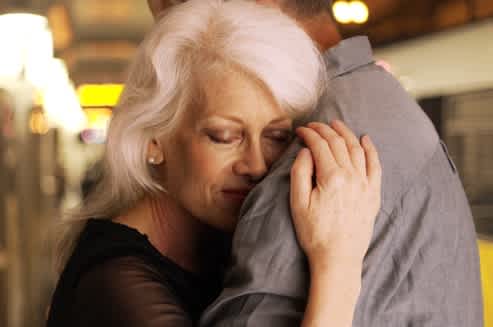Dealing with caregiver guilt and forgiving yourself

A study by the Sloan Center on Aging & Work at Boston College found that older Americans who have engaged caregivers feel happier and more content. However, this isn’t always the case for everyone, and it certainly doesn’t mean that caregiving is easy. But it doesn’t have to be always sad, stressful, or emotional either.
Caring for someone else can take a huge emotional toll, which is why it is so important to take a step back to make sure that you are caring for yourself and addressing your emotional needs.
Grief
Grief is perhaps the most common and surprising emotion felt by caregivers. Even long before the person they love and are caring for passes away, caregivers can become overwhelmed by grief. Strokes, aneurisms, Alzheimer’s, and other ailments with neurological consequences may take from us the people we love long before they pass away. Feeling grief in such situations is completely normal, but that doesn’t mean that you should suffer in silence.
Separating the person that they once were from the person they are now, without sacrificing any love or commitment to them, is an important step. You can’t hold someone suffering from neurological damage to the standard you held them to before. In many ways (like their personality, memory and cognitive function) they are a new person.
Forging a relationship with the “new” person is a great way to combat grief. Many caregivers enjoy sharing artistic outlets, reading, family visits and other stimulating activities that can be tailored to any level of skill or ability. Read more about engaging activities to do with your loved one who suffers from memory loss.
Guilt
Guilt is one of the most common and devastating consequences of being a caregiver. Guilt for mistakes you made in the past, things you said, arguments about trivial things you no longer care about, guilt for neglecting your family, and even guilt for resenting those around you and the care-free life they lead. Many caregivers blame themselves for resenting their role as a caregiver. These feelings are perfectly normal, but that doesn’t make them healthy or productive and could lead to overwhelming caregiver stress.
Identifying feelings of guilt and acknowledging them is a critical first step. Use your personal support network (family, friends, a doctor or a counsellor) to help you maintain your own well-being in trying circumstances.
Forgiveness
Forgiving yourself is the most important step to overcoming guilt. Every caregiver experiences extreme guilt from time to time, but this guilt is almost never warranted, fair, or helpful. No one is perfect, and you can’t blame yourself for taking on the caregiver role, or for delegating it to someone else when you are no longer capable.
You are human, you are imperfect. By taking on the responsibility of being a caregiver at any point in your loved one’s journey you have already shouldered a huge burden under which many people would crumble. You should be proud of yourself, forgive yourself, and remember all the great things you have done, instead of criticizing yourself.
Lack of forgiveness is a common theme for caregivers who find themselves caring for someone who once hurt them or their loved ones. This is often the case for families with a history of domestic or substance abuse. You don’t have to care for a former abuser, rival, or ‘frenemy’ but if you find yourself in a position of doing so then embracing forgiveness is so important- not for them, but for you. Holding onto resentment will only amplify the complex emotions that come with being a caregiver.
The power of forgiveness
Forgiveness is a complicated process to work through that requires you to shine a light on some of the inner parts of your emotional psyche. It is sometimes a painful process, but one that is worth it. Fox News recently reported that forgiveness reduces stress, helps you lose weight and may even help you live longer.
I’ve experienced the healing power of forgiveness first-hand. After finally being able to forgive my mother and father I found relief from my asthma and allergies —conditions that were so bad I was hospitalized on several occasions. I also lost 25 lbs and all my relationships improved, which helped me find happiness.
You’re not alone
Being a caregiver can feel incredibly isolating. To deal with feelings of grief and guilt you need to reach out to your network, and if necessary, to professionals who can help you through the process.